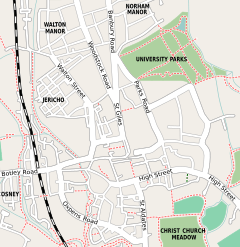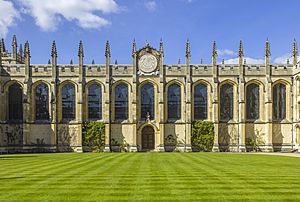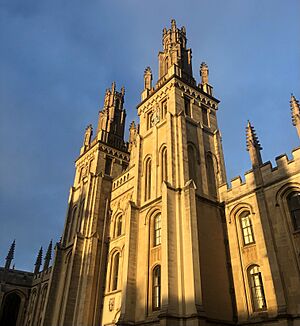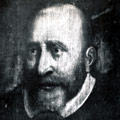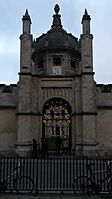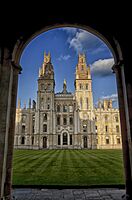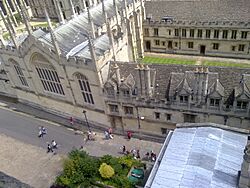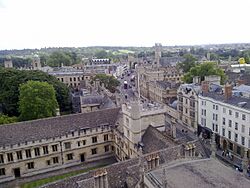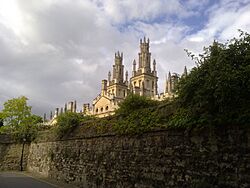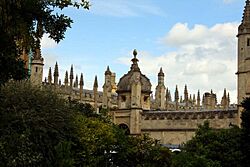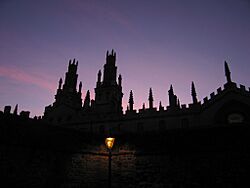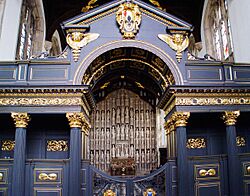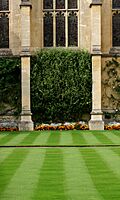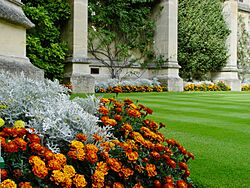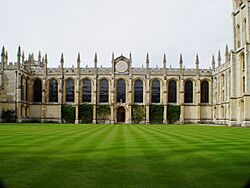All Souls College, Oxford facts for kids
Quick facts for kids All Souls College |
|
|---|---|
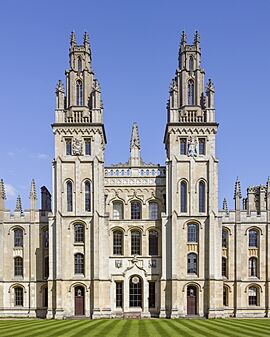 |
|
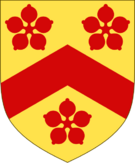
Blazon: Or, a chevron between three cinquefoils gules (arms of Henry Chichele)
|
|
| University | University of Oxford |
| Location | High Street, Oxford OX1 4AL |
| Coordinates | 51°45′12″N 1°15′11″W / 51.753279°N 1.253041°W |
| Full name | College of All Souls of the Faithful Departed |
| Latin name | Collegium Omnium Animarum Fidelium Defunctorum de Oxonia |
| Established | 1438 |
| Named after | Feast of All Souls |
| Sister college | Trinity Hall, Cambridge |
| Warden | Sir John Vickers |
| Undergraduates | None |
| Postgraduates | Less than 6data limitation (2023) |
| Map | |
All Souls College is a special college that is part of the University of Oxford in England. Its full name is the College of the Souls of All the Faithful Departed. What makes All Souls unique is that it doesn't have regular students. Instead, everyone who joins automatically becomes a fellow. A fellow is a full member of the college's main governing group.
Each year, a few recent graduates from Oxford can apply for special examination fellowships. These are given through a very tough test. Some people have even called it "the hardest exam in the world"! If you do well on the exam, you get an interview.
The college is located on High Street in Oxford. It is near Radcliffe Square, The Queen's College, and Hertford College. The current head of the college is Sir John Vickers.
Contents
History of All Souls College
The college was started in 1438 by Henry VI of England, who was the King, and Henry Chichele, who was the Archbishop of Canterbury. They founded it to remember the people who died in the Hundred Years' War. The original rules said the college would have a warden (the head) and forty fellows. All of them had to be religious leaders. Some would study arts and religion, and others would study law.
Today, All Souls College is mainly a place for research. It no longer has regular students. In the past, it did have students. For example, in the late 1500s, students were brought in to help the fellows. But this stopped later on.
For over 500 years, only men could be fellows at All Souls College. But in 1979, women were finally allowed to join as fellows. This was the same year that many other all-male colleges at Oxford also started accepting women.
Buildings and Architecture at All Souls
All Souls College Library
The All Souls College Library was built thanks to a gift from Christopher Codrington in 1710. He was a fellow of the college and had made a lot of money from sugar plantations and enslaved people in the West Indies. He gave books worth £6,000 and £10,000 to rebuild and support the library.
The new library was finished in 1751. It was designed by Nicholas Hawksmoor. It has been used ever since. Today, the library holds about 185,000 items. About a third of these books were printed before 1800. The library is especially strong in books about law and history, including military history.
Sir Christopher Wren, a famous architect, was also a fellow at the college. He designed the sundial on the library building in 1658.
In 2020, the college decided to stop calling it 'The Codrington Library'. This was part of their effort to address the fact that Codrington's wealth came from slave plantations, which was a very unfair and harmful practice.
The College Chapel
The college chapel was built between 1438 and 1442. It stayed mostly the same for a long time. The chapel has 42 special carved seats called misericords. These carvings are from when the chapel was first built.
Later, in the 1660s, a screen was put in the chapel. It was based on a design by Christopher Wren. The chapel needed a lot of repair in the mid-1800s. So, the chapel you see today looks a lot like Victorian designs. The stained glass windows have been moved and fixed many times. But much of the original medieval glass is still there.
All church services in the chapel follow the Book of Common Prayer. They also use the King James Bible instead of newer versions.
College Wealth
All Souls is one of the richest colleges in Oxford. It has a lot of money, called an endowment, which was about £486.7 million in 2023. About 95% of its yearly income comes from this endowment. The college does not get money from student tuition fees.
Fellowships at All Souls
Examination Fellowships
Students who have recently finished their bachelor's or master's degrees from Oxford can apply for these fellowships. Students who graduated elsewhere but are doing postgraduate study at Oxford can also apply. These fellowships last for seven years. They are sometimes called "prize fellowships."
Teachers might suggest their students try for the exam. But anyone who meets the rules can apply. The college also holds an open evening for women who are interested in the exam.
Each year, many people take the exam. Usually, two examination fellows are chosen. Sometimes, only one or three are chosen. Very rarely, no one is chosen.
The competition started in 1878. Women have been able to take it since 1979. It takes place over two days in late September. There are two three-hour exams each day. It has been called "the hardest exam in the world."
Two of the exams are "specialist papers" on a subject you choose. These subjects include classics, English literature, economics, history, law, philosophy, and politics. You can even choose two different subjects for these papers. If you choose Classics, you have an extra translation exam on a third day.
Two other exams are "general papers" on wider topics. For these, you pick three questions from a list. Some past questions have been:
- "If a man could say nothing against a character but what he could prove, history could not be written' (Samuel Johnson). Discuss."
- "Should the Orange Prize for Fiction be open to both men and women?"
Before 2010, there was also an "Essay" exam. For this, you wrote about a single, chosen word.
Four to six finalists are invited for an interview, called a viva voce. In the past, these finalists were also invited to dinner with college members. The dinner was not part of the test. It was a reward for making it to the final stage. But the dinner has been stopped because candidates worried it was part of the test.
About a dozen examination fellows are at the college at any time. They don't have to teach. But they must study or do research in their first two years. They can study anything at Oxford for free, and they get free room and board. They can also work in non-academic jobs if they want, with less pay. But they must still do some academic work part-time and attend dinners at the college. In 2011, each examination fellow received about £14,842 per year for the first two years. The pay changes later depending on their career.
Famous People Who Succeeded
Until 1979, women were not allowed to try for fellowships at All Souls.
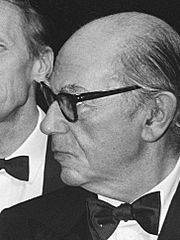
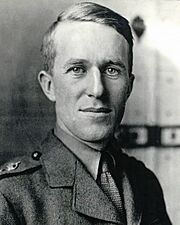
- Leo Amery (1897), a politician
- J. L. Austin (1933), a philosopher
- Sir Isaiah Berlin (1932), a philosopher
- George Earle Buckle (1877), a journalist
- George Curzon, 1st Marquess Curzon of Kedleston (1883), a leader in India
- Geoffrey Dawson (1898), a journalist
- Matthew d'Ancona (1989), a journalist
- John Gardner (1986), a legal philosopher
- Birke Häcker (2001), a legal scholar
- Quintin Hogg, Baron Hailsham of St Marylebone (1931), a politician and philosopher
- Douglas Jay, Baron Jay (1930), a politician
- Richard Jenkyns (1972), a historian and critic
- Keith Joseph, Baron Joseph (1946), a politician
- T. E. Lawrence (1919), "Lawrence of Arabia," a military officer and writer
- M. N. Srinivas, a social anthropologist
- Sir Jeremy Morse, a banker
- Edward Mortimer (1965), a journalist and author
- David Pannick, Baron Pannick (1978), a lawyer
- Derek Parfit (1974), a philosopher
- Sir John Redwood (1972), a politician
- A. L. Rowse (1925), a historian and poet
- Katherine Rundell (2008), an author
- Amia Srinivasan (2009), a philosopher
- John Simon, 1st Viscount Simon (1897), a politician
- William Waldegrave, Baron Waldegrave of North Hill (1971), a politician
- Richard Wilberforce, Baron Wilberforce (1932), a judge
- Sir Bernard Williams (1951), a philosopher
- Crispin Wright (1969), a philosopher
- Sir John Vickers (1979), an economist
Famous People Who Did Not Succeed
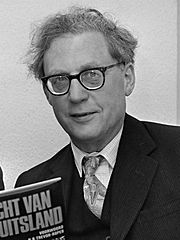
- Hilaire Belloc (1895), an author
- John Buchan, 1st Baron Tweedsmuir (1899), an author and leader in Canada
- Lord David Cecil, an author
- H. L. A. Hart (1929, 1930), a philosopher
- Sir William Holdsworth (1897), a legal historian
- Cosmo Gordon Lang, 1st Baron Lang of Lambeth (1888), an Archbishop of Canterbury
- Harry Mount (1994), a journalist
- Ramsay Muir (1897), a politician
- Tom Denning, Baron Denning (1923), a judge
- Hugh Trevor-Roper, Baron Dacre of Glanton, a historian
- Eric Williams, a historian and politician
- Harold Wilson, Baron Wilson of Rievaulx, a Prime Minister
- Tom Bingham, Baron Bingham of Cornhill, a judge
Essay Topics from the Exam
Here are some words that were used as essay topics in the past:
- "bias"
- "censorship"
- "chaos"
- "charity"
- "comedy"
- "conversion" (1979)
- "corruption"
- "culture" (1914)
- "diversity" (2001)
- "error" (1993)
- "harmony" (2007)
- "innocence" (1964)
- "integrity" (2004)
- "mercy"
- "miracles" (1994)
- "morality"
- "novelty" (2008)
- "originality"
- "possessions" (1925)
- "reproduction" (2009)
- "style" (2005)
- "water" (2006)
Other Types of Fellowships
All Souls College has different kinds of fellows:
- Senior research fellows: These fellows are appointed for seven years to do research.
- Visiting fellows: These are academics from other universities who come for a short time.
- Post-doctoral research fellows: These are for people who have just finished their PhDs.
- Official fellows: These are people who hold specific jobs at the college, like the librarian.
- Distinguished fellows: These are highly respected individuals.
There are also professors who are fellows because of their teaching positions at the University.
Chichele Professorships
Some fellows at the college are called Chichele professors. These are special professors at the University of Oxford. They are named after Henry Chichele, who helped found the college. Being a Chichele professor has meant being a fellow of the college since 1870.
There are currently Chichele Professorships in five different subjects:
- Chichele Professor of Economic History: Kevin O'Rourke
- Chichele Professor of the History of War: Peter H. Wilson (appointed 2015)
- Chichele Professor of Public International Law: Catherine Redgwell (appointed 2012)
- Chichele Professor of Social and Political Theory: Amia Srinivasan (appointed 2019)
- Chichele Professor of Medieval History: Julia M. H. Smith (appointed 2016)
One of the most famous former Chichele Professors was Sir Isaiah Berlin.
Chichele Lectures
The Chichele Lectures are a series of important talks. They started in 1912 and are supported by All Souls College. At first, they were only about foreign history. Now, they cover law, politics, economics, and both foreign and British history. Sometimes one person gives all the talks, and sometimes several people talk about a common topic.
College Traditions
Every 100 years, usually on January 14, All Souls College has a special feast. After the feast, the fellows walk around the college with flaming torches. They sing the Mallard Song. They are led by a "Lord Mallard" who is carried in a chair. They are supposedly looking for a legendary duck (a mallard) that flew out of the college's foundations when it was being built.
During this "hunt," a person walks in front of the Lord Mallard. This person carries a pole with a mallard tied to it. In the past, it was a real bird. More recently, it has been a dead bird (in 1901) or a wooden carving (in 2001). The last mallard ceremony was in 2001. The next one will be in 2101. No one knows exactly how this tradition started, but it has been happening since at least 1632.
People Connected to All Souls
Fellows of All Souls College
Many important people have been fellows of the college:
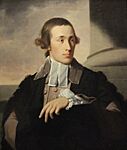

- William Emmanuel Abraham
- Diwakar Acharya
- Leo Amery
- William Reynell Anson
- Andrew Ashworth
- F. W. Bain
- Max Beloff
- Isaiah Berlin
- Margaret Bent
- Tim Besley
- Peter Birks
- Susanne Bobzien
- William Blackstone
- Malcolm Bowie
- Peter Brown
- Julian Bullard
- Myles Burnyeat
- Lionel Butler
- Raymond Carr
- David Caute
- Alasdair Clayre
- Christopher Codrington
- Gerald Cohen
- Peter Conrad
- George Nathaniel Curzon
- Matthew d'Ancona
- David Daube
- David Dilks
- Michael Dummett
- Edward Evan Evans-Pritchard
- Cécile Fabre
- Sheppard Frere
- Diego Gambetta
- John Gardner
- Robert Gascoyne-Cecil, 3rd Marquess of Salisbury
- Robert Gentilis
- Gabriel Gorodetsky
- Birke Häcker
- Ruth Harris
- Andrew Harvey
- Reginald Heber
- Hensley Henson
- Cecilia Heyes
- Rosemary Hill
- Quintin Hogg, Baron Hailsham of St Marylebone
- Christopher Hood
- John Hood (university administrator)
- Roger Hood
- Michael Howard
- Susan Hurley
- E. F. Jacob
- Keith Joseph
- Colin Kidd
- Leszek Kołakowski
- Cosmo Gordon Lang
- T. E. Lawrence
- Edward Chandos Leigh
- Thomas Linacre
- Vaughan Lowe
- Stephen Lushington
- Robert Gwyn Macfarlane
- James Rochfort Maguire
- Noel Malcolm
- John Mason
- Angela McLean
- Catherine Morgan
- Edward Mortimer
- Max Müller
- Patrick Neill, Baron Neill of Bladen
- Brownlow North
- Avner Offer
- David Pannick
- Derek Parfit
- Anthony Quinton
- Sarvepalli Radhakrishnan
- Robert Recorde
- Catherine Redgwell
- John Redwood
- A. L. Rowse
- Katherine Rundell
- Peter Salway
- Andrew Scott
- Graeme Segal
- Amartya Sen
- Catriona Seth
- Patrick Shaw-Stewart
- Gilbert Sheldon
- John Simon, 1st Viscount Simon
- Boudewijn Sirks
- Margareta Steinby
- Alfred C. Stepan
- Joseph E. Stiglitz
- Charles Taylor
- Adam Thirlwell
- Guenter Treitel
- Cecilia Trifogli
- John Vickers
- William Waldegrave, Baron Waldegrave of North Hill
- Kate Warner
- Marina Warner
- Martin Litchfield West
- Charles Algernon Whitmore
- Richard Wilberforce
- Bernard Williams
- E. F. L. Wood, 1st Earl of Halifax
- Llewellyn Woodward
- Patrick Wormald
- Christopher Wren
- Crispin Wright
- Edward Young
- R. C. Zaehner
- Lucia Zedner
Wardens of All Souls College
Gallery
-
The gates on Radcliffe Square
-
A view of All Souls from the Radcliffe Square gate, showing Nicholas Hawksmoor's 'gothicised classical' elevation.
-
All Souls Quad next to High Street
-
View from St Mary the Virgin's tower (with All Souls on the right)
-
All Souls College. This building, designed by Nicholas Hawksmoor, looks old on the outside but is classical inside.
See also
 In Spanish: All Souls College para niños
In Spanish: All Souls College para niños


